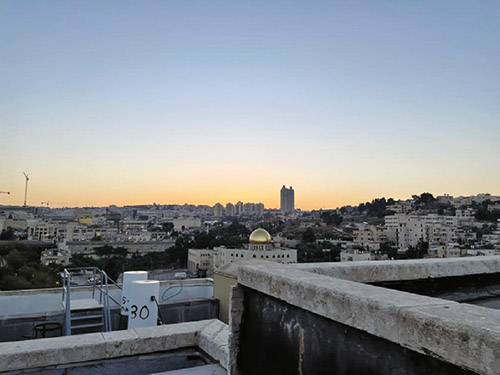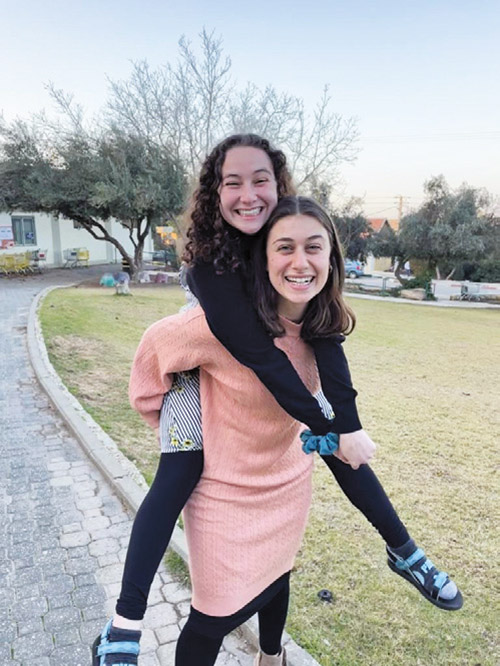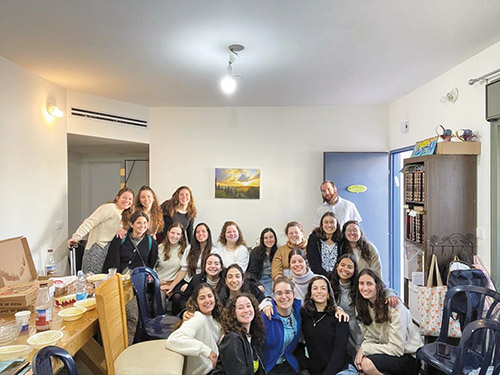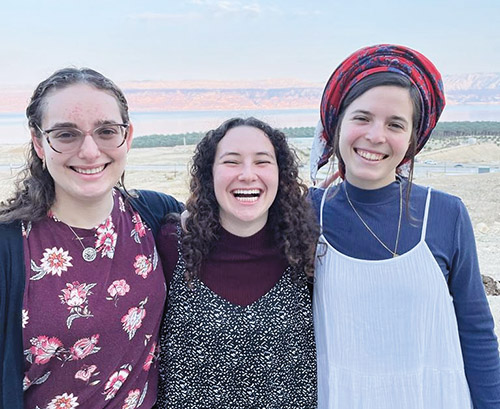
A graduate of Ma’ayanot, Rina Rogers continues to engage in serious Torah study at Midreshet Nishmat. Born and raised in New Jersey, she plans on continuing her Judaic journey when she makes Aliyah in June. Her family davens at Congregation Ohr Torah in West Orange, New Jersey.
Why were you drawn to Nishmat, and what makes it different from the other Midrashot you were considering?
I knew I was going to be making Aliyah so I wanted an immersive Hebrew learning environment. I didn’t want to spend my year in Israel in an American bubble.
Nishmat is very open-minded, which was important to me. It’s feminist and flexible, but still deeply rooted in Halakha. I’ve always been drawn to Gemara and wanted to continue strengthening that at Midrasha.

What were your expectations going into Nishmat and how’d they differ from reality?
I wasn’t expecting the culture shock. I thought the social atmosphere would be similar to camp and I’d instantly make friends. However, when not everyone speaks the same language, that goal becomes harder. I’m used to being funny, but even after I started speaking Hebrew I wasn’t funny in Hebrew.
It took some time, but the adjustment was worth it. I’m funny in Hebrew now! I think so, at least because I get some laughs.

How have your skills developed since coming to Nishmat?
My Hebrew and Gemara skills have dramatically improved. I used to dread learning b’chavruta because I couldn’t understand the Gemara without help. Now I don’t need an English translation. If I don’t understand something, I have the tools to figure it out on my own. I even started Daf Yomi.
What do you enjoy learning?
Anything – Kabbalah, Chassidut or Gemara-related material. I’ve really enjoyed reading Rav Ashlag z”tl on Kabbalah. I also love anything by Rav Sacks z”tl or Rav Soleveitchik z”tl.

Which teacher do you connect with the most?
At Nishmat you get to pick your classes, so I only go to classes if I connect with the teacher. I love them all in different ways, but if I had to pick one, I’d say Rav Kobi. He’s an amazing Gemara teacher and the reason I have all my skills.
What’s your favorite class?
I have three I can’t miss. Can I say three?
Sure, go for it.
I take a Chassidut class with Tochnit Maayan, the Ethiopian program at Nishmat. The class is rooted in Kabbalah and super interesting, but it’s also cool to learn with people who come from such a different culture.
On Tuesdays, I have a great class on Mesilat Yesharim that’s taught with a Chassidic lens. Afterwards, I have HaRav Sabato. We take a philosophical approach towards understanding the chamesh Megillot. Analyzing Tanakh in this intellectual way makes for a good contrast to the more spiritual classes I’m in. It’s nice to get my taste of philosophy.
He’s also really funny. Not traditionally funny – I’m usually the only one laughing – but he laughs at my jokes too. We’ve got a thing going.
What do you enjoy most about the style of learning at Nishmat?
There’s a great balance between Gemara and Chassidut.
I’ve been learning Gemara for six years but I’ve never learned more Gemara than I have this year. I learned how to contextualize Rishonim and Achronim and the voices of the Gemara. It’s not just what they say, but their meaning and implications. Methodically analyzing a single line of Gemara and going through every single commentary’s interpretation is incredible. It’s like the text comes alive in front of you.
The spirituality comes from the hashkafa of the people, but it’s also a warm, loving, and welcoming environment. We have beautiful Rosh Chodesh davening, wonderful chagigot, and people dance in the Beis at every opportunity. There are a lot of Chassidut classes, but each is a different type of Chassidut. It’s very authentic because the teachers actually believe in what they’re teaching.
What do you think you gain from experiencing both of these approaches together?
They work in tandem to give a greater appreciation of Torah. It’s intense but meaningful and allows you to see Torah for what it is – Torah.
Where is your favorite place to spend Shabbat?
Tzfat. Oh my goodness. Tzfat.
Outside of that, I have an adopted family I go to for Shabbat meals. I love hanging out with them. I’ll even go during in-shabbatot.
Where is your go-to relaxation spot?
I love the roof and balcony. They overlook Yerushalayim and the view is stunning. I also love reading near the train tracks in Park HaMesila.
What do you love most about being in Israel?
I’m here to connect to Hashem. Living in Israel makes that easier. Avodat Hashem is relatively conflict-free because the weeks revolve around the Jewish calendar. I also get to do Mitzvot like Shemittah, which can only be done in Israel.
What’s been the highlight of your year?
During Purim, I went to my friend’s house outside of Yerushalayim and experienced an authentic Israeli Purim. Then I came back to celebrate Shushan Purim at Nishmat. I got to give Mishloach Manot to people working during Purim. They weren’t expecting anyone to get them anything and their faces would light up. I never could’ve connected with people that way back in America.
What makes Nishmat such a good fit for you?
I value open-mindedness, adherence to Halakha, and serious learning. All these values are shared by Nishmat. The learning here is deep, but it doesn’t exist in a vacuum. It’s complemented by dancing, singing, and ruach. I don’t think I could pinpoint exactly what reflects me in Nishmat, but I couldn’t have built a better place.
How has this year impacted your life?
I’ve definitely learned how to learn on my own, but it’s also shaped my life in other ways. It taught me responsibility and allowed me to think hard about what I wanted for myself. If I didn’t go to Nishmat, I don’t know if I’d be making Aliyah this year. Maybe I’d go back to college in America. I’m in charge of myself and for the first time in my life I feel I can live on my own.
Why did you decide to make aliyah?
I put religious observance at the center of my life. If my observance is easier, my life is easier and everything in terms of Judaism is easier in Israel. This is the right place for me. I can’t imagine living anywhere else.
What advice would you give to an incoming Shana Aleph student?
Towards the end of the year, a lot of people feel they wasted their first months here. It’s important to understand from the beginning what you want from the year so you can make the right decisions for yourself.
It’s the most classic thing in the world, but this is the only time you have to completely focus on yourself. You get to learn and explore your interests for their own sake; not for some test grade. Take advantage of that.
David Deutsch of Woodmere, New York, is a Shana Bet student currently studying at Migdal HaTorah in Modi’in.










